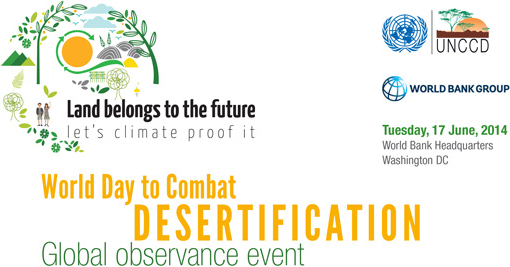 17 June 2014: To commemorate the World Day to Combat Desertification (WDCD) 2014, the UN Convention to Combat Desertification (UNCCD) organized, and the World Bank hosted, in partnership with the Global Environment Facility (GEF), TerrAfrica and Connect4Climate, a day-long ‘Global Observance Event’ on ecosystem-based adaptation under the theme, ‘Land Belongs to the Future – Let’s Climate Proof it.’ The event fostered high-level discussions on common solutions to the interlinked challenges of climate change and desertification.
17 June 2014: To commemorate the World Day to Combat Desertification (WDCD) 2014, the UN Convention to Combat Desertification (UNCCD) organized, and the World Bank hosted, in partnership with the Global Environment Facility (GEF), TerrAfrica and Connect4Climate, a day-long ‘Global Observance Event’ on ecosystem-based adaptation under the theme, ‘Land Belongs to the Future – Let’s Climate Proof it.’ The event fostered high-level discussions on common solutions to the interlinked challenges of climate change and desertification.
Opening the event, Monique Barbut, UNCCD Executive Secretary, called climate change and desertification “threat multipliers,” commenting that with the onset of more droughts and floods, no country is immune to climate change. She added that land-based adaptation is one of the key ways communities can climate proof their future. In a keynote address, Brigi Rafini, Prime Minister of Niger, described how climate change has exacerbated desertification in his country, and how it has fought desertification to improve livelihoods.
Many panel speakers discussed the intersection of climate change, desertification and poverty. During a session on ‘Regreening Ethiopia’s Highlands: A New Hope for Africa,’ Tebege Berhe, Deputy Chief of the Ethiopian Mission to the US, noted that while the onset of climate change has caused more erratic rainfall, Ethiopia’s land management programmes have resulted in farmers maintaining water banks. He explained that in turn, these back-up water sources have increased income and food security.
Participating in the panel with Berhe, Jamal Saghir, Director of Africa Sustainable Development at the World Bank, expressed concern that despite being “on the table” well before the climate change agenda emerged, the fight against desertification might be left behind. Andrew Revkin, Senior Fellow at Pace University, picked up on this theme in the subsequent session on Ecosystem-based Adaptation (EbA). He highlighted that regardless of what happens with climate change negotiations, the realities of desertification are underway and must be addressed.
Benoit Bosquet, Sector Manager at the World Bank, added that the dilemma of scaling financing for both desertification and climate change underscores the need to fund climate change measures that also mitigate desertification. Ethiopia, for example, has capitalized on carbon financing and REDD+ funds to improve its forests, which will also sequester carbon, he noted. Gustavo A. B. da Fonseca, Global Environment Facility (GEF) Secretariat, pointed out that given the linkages among conservation, land management, climate change and livelihoods, if intergovernmental work and international agreements on these issues could avoid “getting stuck in separate tracks,” opportunities for crosscutting action could be realized.
The Global Observance Event was held at World Bank headquarters in Washington DC, US, on 17 June 2014. [IISD RS coverage of WDCD2014] [WDCD2014 Website]